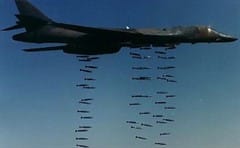
President Barack Obama’s claim that he doesn’t need congressional authorization for his current war in Iraq and Syria is troubling. The country’s founders would pass out upon hearing his claim that the post-9/11 congressional approval of force in 2001 against the perpetrators of those attacks and their abettors and the congressional resolution approving George W. Bush’s invasion of Saddam Hussein’s Iraq in 2003 give him the current authority for a very different war against very different people. However, Obama is not the first president to believe that he has the rather imperial authority for war by executive fiat.
Up until 1950, for major conflicts, presidents followed the nation’s founders’ intent in the U.S. Constitution to obtain a declaration of war from Congress. For the Korean War, however, Harry Truman, really the first imperial president, decided that this vital constitutional requirement was optional. Unfortunately, as I note in my new book — Recarving Rushmore: Ranking the Presidents on Peace, Prosperity, and Liberty — once a bad precedent is set, meaning that the chief executive gets away with an unconstitutional act, future presidents will cite it in carrying out their own questionable actions.
Over American history, that process has thus resulted in an expansion of presidential power much past what the founders had envisioned when they wrote their constitutional blueprint. Thinking of the powerful European monarchs of the day, who took their countries to war on a whim and let the costs in blood and treasure fall to their unfortunate citizens, the founders wanted an executive with severely restricted powers. Congress was to be the dominant branch of government, and the executive’s role merely was to narrowly execute and enforce laws passed by that body. Even the president’s commander-in-chief role, much abused by modern chief executives, was to be restricted narrowly to commanding the U.S. military in battle. In fact, contrary to the conventional belief in Washington and among the American public, the Constitution gives most of the powers in defense and foreign affairs to the Congress, not to the president. The erroneous notion that the chief executive is the “sole organ of American foreign policy,” derives from the non-binding part of a Supreme Court decision in the 1930s (that is, fairly recently).
In the Constitution, the founders signaled their intent for Congress to approve even minor uses of force by the United States. The document says that Congress will issue letters of marque and reprisal. At the time, letters of marque were issued to private ship captains to raid an enemy nation’s commerce.
So it is curious from his past behavior that Obama, a constitutional lawyer, believes that if he avoids putting “combat troops” on the ground — defining this narrowly to exclude Special Forces hunting terrorists and American military trainers of local forces — and limits his attacks to air strikes, it’s not a real war that would require congressional approval. His criterion seems to be that if no Americans would be killed, it’s not a “war” that the Congress needs to bother with authorizing. Yet aircraft can get shot down or malfunction and pilots can be captured or killed. Also, the people being bombed would probably call it a war, and so the people’s representatives in Congress might want to comment on whether the United States should be in a state of hostilities with them.
The people’s representatives don’t always make the right decision — as they didn’t in President James Madison’s pointless War of 1812, James Polk’s war of aggression against the weaker Mexico to steal its land, William McKinley’s colonial Spanish-American War, or Woodrow Wilson’s ruining of the twentieth century by American entry into World War I — but they should at least get to vote, as the nation’s founders intended and the Constitution states.
